
Viral Hepatit Dergisi-Viral Hepatitis Journal
Scope & Guideline
Championing the future of hepatitis research.
Introduction
Aims and Scopes
- Clinical Management of Viral Hepatitis:
The journal emphasizes studies that explore the clinical management and treatment efficacy of various antiviral therapies for hepatitis B, C, and E, including real-world data and case reports. - Epidemiology and Seroprevalence Studies:
A significant focus is placed on understanding the epidemiology of viral hepatitis, including seroprevalence studies across different populations and risk groups, such as refugees and healthcare workers. - Innovative Diagnostic Tools and Technologies:
Research on new diagnostic methodologies, including the application of artificial intelligence and non-invasive techniques for liver disease assessment, is a key area of exploration. - Hepatitis Coinfections and Comorbidities:
The journal investigates the implications of hepatitis coinfection with HIV and other viruses, as well as the impact of comorbid conditions like diabetes on hepatitis outcomes. - Public Health and Access to Treatment:
Public health initiatives, barriers to treatment access, and vaccination programs are critical themes, reflecting the journal's commitment to improving health outcomes on a broader scale.
Trending and Emerging
- Real-World Data and Treatment Outcomes:
There is an increasing emphasis on real-world data concerning treatment outcomes and patient responses to antiviral therapies, underscoring the importance of practical evidence in clinical decision-making. - Artificial Intelligence in Hepatitis Management:
The integration of artificial intelligence for improving diagnosis and management of viral hepatitis represents a cutting-edge trend that is gaining traction within the journal's publications. - Impact of COVID-19 on Hepatitis Care:
The exploration of how the COVID-19 pandemic has affected hepatitis management and treatment access highlights an emerging theme that is critical for understanding the broader implications of global health crises. - Genetic and Molecular Research:
An increasing number of studies focusing on genetic factors, such as polymorphisms affecting treatment responses, indicate a growing trend towards personalized medicine in hepatitis treatment. - Non-Invasive Assessment Techniques:
Research into non-invasive methods for assessing liver health and fibrosis is on the rise, reflecting advancements in technology and the need for more patient-friendly diagnostic options.
Declining or Waning
- Traditional Treatment Methods:
Research focusing on older treatment regimens, such as pegylated interferon therapies, has decreased as newer direct-acting antiviral agents gain prominence due to their increased efficacy and safety. - Animal Models in Hepatitis Research:
There appears to be a reduction in studies utilizing animal models for hepatitis research, possibly due to a growing emphasis on human clinical data and real-world evidence. - General Hepatitis A Research:
Research specifically targeting hepatitis A has become less frequent, suggesting a possible shift in focus to more pressing issues related to hepatitis B, C, and E.
Similar Journals

Canadian Liver Journal
Empowering Knowledge for Liver Health.Canadian Liver Journal, published by University of Toronto Press Inc., offers a dedicated platform for the dissemination of cutting-edge research in the field of Hepatology. With an E-ISSN of 2561-4444, this journal plays a pivotal role in advancing knowledge related to liver diseases and therapies, currently ranked in the 3rd quartile (Q3) for the 2023 category in Hepatology—a reflection of its growing influence in the biomedical research community. The journal, which has been in circulation since 2018 and sets its sights on contributing valuable insights until 2024, aims to engage researchers, clinicians, and students alike by providing a rigorous peer-reviewed environment for sharing findings, case studies, and reviews pertinent to liver health. Through its commitment to excellence and scholarly impact, the Canadian Liver Journal serves as an essential resource for those dedicated to combating liver diseases and enhancing patient care.

Hepatitis Monthly
Transforming insights into impactful clinical practices.Hepatitis Monthly, published by BRIEFLAND in the Netherlands, is a pivotal journal in the fields of hepatology and infectious diseases. Established in 2007, it continues to make significant contributions to the understanding and management of hepatitis and related viral infections with a publication timeline extending through to 2024. Aiming to disseminate high-quality research, the journal serves as a forum for groundbreaking studies and innovations essential for healthcare professionals, researchers, and students alike. While it currently holds Q4 rankings in both hepatology and infectious disease categories, its ongoing commitment to addressing pressing health issues makes it an important resource in the academic community. Although it operates under a traditional access model, Hepatitis Monthly not only publishes original research articles, reviews, and case studies but also encourages the exchange of knowledge that helps shape future research directions and clinical practices. As it continues to explore the complexities surrounding viral hepatitis, this journal invites researchers to contribute to its mission of advancing scientific understanding and improving patient care.
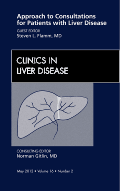
Clinics in Liver Disease
Unveiling the complexities of hepatology for better care.Clinics in Liver Disease is an esteemed peer-reviewed journal published by W B Saunders Co-Elsevier Inc, dedicated to advancing the field of hepatology. Established in 1997 and covering a broad range of topics within liver disease research, this journal serves as a vital resource for researchers, clinicians, and students engaged in the study of liver health and diseases. With a commendable impact factor placing it within the Q2 category in Hepatology and ranking #32 out of 82 in the Scopus classifications, it consistently disseminates high-quality research and clinical insights. The journal’s commitment to promoting understanding and management of liver diseases is reflected in its rigorous editorial standards and comprehensive review processes. Although not an open-access publication, Clinics in Liver Disease offers subscription options that ensure accessibility to up-to-date research and reviews critical for both academic and clinical success.

Advances in Virology
Unlocking the Secrets of Viruses and Infectious DiseasesAdvances in Virology, an esteemed journal published by HINDAWI LTD, serves as a pivotal platform for cutting-edge research in the field of virology and infectious diseases. With its ISSN 1687-8639 and E-ISSN 1687-8647, the journal has been a significant contributor to the scientific community since its initiation as an Open Access resource in 2009, allowing researchers from around the globe to access groundbreaking findings without barriers. Operating out of the United States and recognized for its commitment to high-quality research, the journal's relevance is underscored by its ranking in the Q3 category for Infectious Diseases and Q4 for Virology as of 2023. The time frame of publications spans from 2009 to 2024, reflecting a continuous commitment to exploring the evolving landscape of virology. This journal not only promotes the dissemination of novel insights and methodologies but also fosters collaboration and innovation within the scientific community, making it an invaluable resource for researchers, professionals, and students alike.
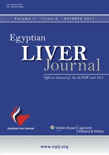
Egyptian Liver Journal
Transforming liver health through shared knowledge.The Egyptian Liver Journal, ISSN 2090-6218, is a vital resource for the hepatology community, published by SPRINGEROPEN. Since its establishment in 2012, this journal has served as a platform for disseminating significant findings in liver research, with an emphasis on enhancing understanding and treatment of liver diseases. Recognized with a Q3 ranking in Hepatology for 2023, the Egyptian Liver Journal aims to bridge the gap between research and clinical practice through its commitment to open access, fostering a global exchange of knowledge without barriers since 2019. With a focus on innovative studies, reviews, and clinical guidelines, the journal appeals to a diverse audience of researchers, clinicians, and students dedicated to advancing liver health. Situated in the heart of the United States, this publication addresses the pressing issues within the field and encourages submissions that address the future of liver care and treatment.
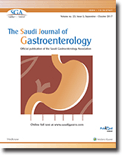
Saudi Journal of Gastroenterology
Empowering knowledge for better digestive health.The Saudi Journal of Gastroenterology is a premier platform dedicated to advancing research and clinical practice in the field of gastroenterology. Published by Wolters Kluwer Medknow Publications, this open-access journal has been serving the academic community since 1995 from its base in India. With an ISSN of 1319-3767 and an E-ISSN of 1998-4049, the journal allows unrestricted access to a wealth of knowledge, fostering an environment where researchers, professionals, and students can engage with cutting-edge studies. As of 2023, it is categorized in the Q3 quartile within gastroenterology, ranking #74 out of 167 in Scopus, which places it within the 55th percentile of its field. The journal aims to disseminate significant findings, clinical trials, and innovative theories that shape the understanding of gastrointestinal disorders and practices. With a commitment to quality and relevance, the Saudi Journal of Gastroenterology is pivotal for anyone seeking to enhance their knowledge and expertise in this vital area of medicine.

AIDS Research and Therapy
Transforming insights into action against HIV/AIDS.AIDS Research and Therapy is a prestigious peer-reviewed journal dedicated to disseminating cutting-edge research in the fields of AIDS and HIV therapy. Published by BMC, this Open Access journal has been freely available since its inception in 2004, facilitating global access to vital research findings. Based in the United Kingdom, the journal covers a diverse range of topics including molecular medicine, pharmacology, and virology, making it a crucial resource for researchers and clinicians alike. Recognized for its strong impact within the scientific community, it holds a Q2 quartile ranking in multiple categories as of 2023, including Molecular Medicine and Pharmacology. With an aim to enhance understanding and improve clinical outcomes for those affected by HIV/AIDS, AIDS Research and Therapy serves as an essential platform for the exchange of innovative ideas and practices that can inform future therapies and interventions. Researchers, professionals, and students seeking high-quality, peer-reviewed content will find this journal invaluable in advancing their knowledge and efforts in combating the HIV/AIDS epidemic.
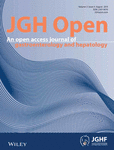
JGH Open
Empowering the Future of Gastrointestinal MedicineJGH Open is a prominent open-access journal dedicated to advancing knowledge in the fields of Gastroenterology and Hepatology, published by WILEY. Since its inception in 2017, the journal has served as a crucial platform for researchers, professionals, and students to disseminate innovative research findings and clinical insights. With an impact factor and Scopus rankings reflecting its steady growth—ranking in the 3rd quartile for both Gastroenterology (Q3) and Hepatology (Q3)—JGH Open is positioned within the competitive landscape of medicine. Its commitment to open access enhances the visibility and accessibility of high-quality research, ensuring that significant advancements in understanding diseases of the gastrointestinal tract and liver reach a broad audience. With a focus on collaboration and dissemination of knowledge, JGH Open aims to contribute to the global discourse and improve outcomes in gastrointestinal health.

Hepatology Communications
Connecting researchers and clinicians in hepatology.Hepatology Communications, published by Lippincott Williams & Wilkins, serves as a pioneering platform in the field of hepatology, dedicated to advancing the understanding of liver diseases and treatments. Since its inception in 2017, this open access journal has rapidly gained recognition, achieving an impressive Q1 ranking in Hepatology as of 2023, and appealing to a diverse audience of researchers, clinicians, and students alike. With its focus on high-quality research and clinical studies, the journal aims to facilitate impactful discussions and disseminate vital findings that address the challenges faced in liver health. Operating out of the United States, and accessible globally, Hepatology Communications is committed to fostering a collaborative research environment and enhancing the visibility of scholarly work in hepatology, ultimately driving forward innovations in patient care and treatment strategies.
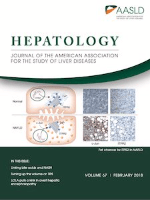
HEPATOLOGY
Empowering researchers and clinicians in the field of hepatology.HEPATOLOGY is a premier scholarly journal dedicated to advancing the field of liver research and clinical practice. Published by Lippincott Williams & Wilkins, this journal boasts an impressive impact factor and holds a prestigious position as one of the top-ranked publications in both Hepatology (Q1) and Medicine (miscellaneous, Q1) categories as of 2023. HEPATOLOGY, with its commitment to disseminating high-quality research since its inception in 1981, serves as an essential platform for researchers, clinicians, and students focusing on liver diseases, including hepatitis, cirrhosis, and liver cancer. The journal's editorial board comprises leading experts who guide the publication towards its objective of fostering innovation and collaboration in this critical area of health. Although it does not offer an open access model, HEPATOLOGY ensures that its comprehensive analyses, reviews, and groundbreaking studies are accessible to the global medical community. Join the discourse in hepatology and be a part of a transformative journey through this indispensable resource.